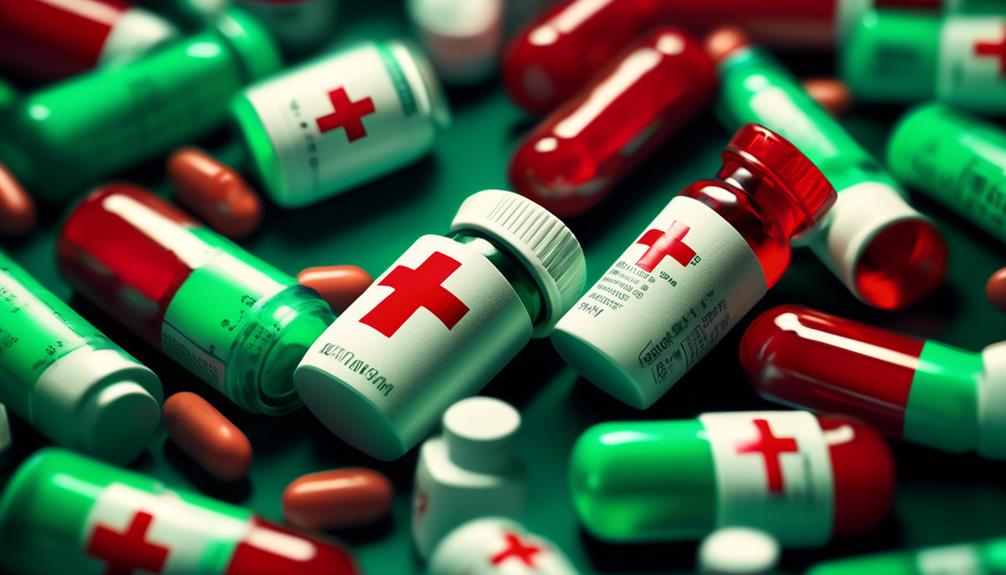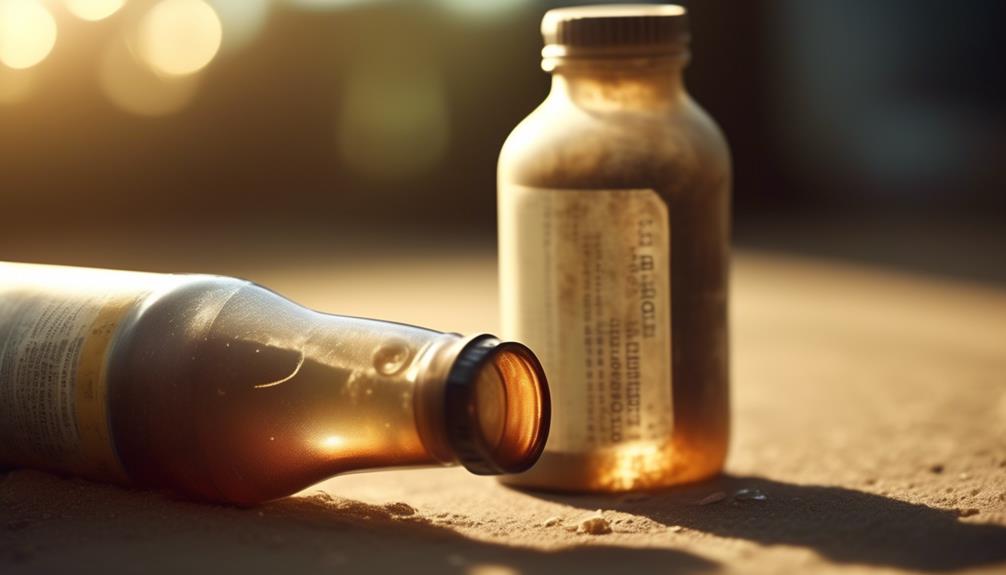Glutathione, a natural antioxidant produced by our bodies, has gained popularity for its potential health benefits. However, like any other supplement, it is important to be aware of certain factors that may hinder its effectiveness. From timing of consumption to potential interactions with medications and supplements, there are several considerations one should keep in mind. Moreover, lifestyle choices such as alcohol and tobacco usage can impact the efficacy of glutathione. Additionally, proper storage and handling of the supplement are crucial for maintaining its potency. By avoiding these pitfalls, individuals can optimize their experience with glutathione and potentially reap its full benefits. But what are the specific details and reasons behind these precautions? Let's explore further.
Key Takeaways
- Take glutathione on an empty stomach or with a light meal to maximize absorption.
- Avoid consuming protein-rich foods or beverages with glutathione as they may interfere with its effectiveness.
- Avoid alcohol and caffeine before or after taking glutathione as they can deplete glutathione levels and hinder its benefits.
- Store glutathione in a cool, dry place away from direct sunlight and heat to maintain its potency and effectiveness.
Timing of Consumption

The timing of consumption is an important factor to consider when taking glutathione to avoid potential side effects. To ensure optimal results and minimize any adverse reactions, it is crucial to follow the recommended dosage and timing guidelines.
When it comes to the optimal dosage of glutathione, it is best to consult with a healthcare professional who can assess your specific needs and provide personalized advice. The recommended dosage may vary depending on factors such as age, weight, and overall health. It is important not to exceed the recommended dosage as this can increase the risk of side effects.
In terms of timing, it is generally recommended to take glutathione on an empty stomach or with a light meal. This allows for better absorption and utilization of the supplement. Avoid taking glutathione with foods or beverages that are rich in protein, as they can interfere with its absorption. It is also advisable to avoid consuming alcohol or caffeine shortly before or after taking glutathione, as they may impact its effectiveness.
Potential side effects of glutathione are generally rare and mild, but they can occur. These may include gastrointestinal discomfort, allergic reactions, or skin rashes. If you experience any of these side effects, it is important to discontinue use and seek medical attention if necessary.
High Oxidative Stress Levels
High levels of oxidative stress can have detrimental effects on the body's overall health and function. Oxidative stress occurs when there is an imbalance between the production of reactive oxygen species (ROS) and the body's ability to neutralize them with antioxidants. This imbalance can lead to damage to cells, tissues, and organs, and is associated with various health conditions such as cardiovascular disease, neurodegenerative disorders, and cancer.
Chronic inflammation, often caused by high oxidative stress levels, can further exacerbate these health issues. Inflammation is the body's natural response to injury or infection, but when it becomes chronic, it can lead to tissue damage and contribute to the development of diseases. Oxidative stress and chronic inflammation have a complex relationship, as oxidative stress can promote inflammation, and chronic inflammation can increase oxidative stress.
Environmental toxins and pollutants are also known to increase oxidative stress levels in the body. These toxins can be found in air pollution, industrial chemicals, pesticides, and heavy metals. When exposed to these toxins, the body's antioxidant defense system may become overwhelmed, leading to increased oxidative stress.
To mitigate the negative effects of high oxidative stress levels, it is important to support the body's antioxidant defense system. This can be done by consuming a diet rich in antioxidants, such as fruits, vegetables, and whole grains. Additionally, supplementing with antioxidants like glutathione can also help reduce oxidative stress.
Certain Medications and Supplements

Certain medications and supplements can potentially cause side effects when used in conjunction with glutathione. It is important to be aware of these potential drug interactions to ensure the safe and effective use of glutathione.
One common group of medications that can interact with glutathione is chemotherapy drugs. Glutathione has been found to reduce the effectiveness of certain chemotherapy drugs, such as cisplatin and doxorubicin. This can result in reduced treatment efficacy and potentially compromise the patient's health. Therefore, it is crucial for individuals undergoing chemotherapy to consult with their healthcare provider before starting glutathione supplementation.
Additionally, certain supplements can also interact with glutathione and lead to potential side effects. For instance, high doses of vitamin C may interfere with the body's ability to utilize glutathione effectively. This can result in reduced glutathione levels and compromise its antioxidant and detoxification functions. Therefore, individuals taking high doses of vitamin C should exercise caution when considering glutathione supplementation.
Furthermore, it is important to note that the use of glutathione in conjunction with certain medications, such as acetaminophen, can increase the risk of liver damage. Acetaminophen is metabolized in the liver, and the simultaneous use of glutathione may interfere with this process and lead to liver toxicity. Therefore, individuals taking acetaminophen should consult with their healthcare provider before using glutathione.
Alcohol and Tobacco Usage
Alcohol and tobacco usage can also contribute to potential side effects when combined with glutathione supplementation. It is important to be aware of the potential risks and to make informed decisions about alcohol consumption and tobacco usage while taking glutathione.
Alcohol consumption can have negative effects on the body's ability to produce and utilize glutathione. It can deplete glutathione levels and interfere with the body's natural detoxification processes. This can lead to an increased risk of oxidative stress and other health complications. Additionally, alcohol can impair liver function, which is a crucial organ for glutathione synthesis and utilization. Therefore, excessive alcohol consumption can hinder the effectiveness of glutathione supplementation.
Similarly, tobacco usage can also impact glutathione levels and function. Smoking introduces harmful chemicals into the body, which can deplete glutathione and increase oxidative stress. It can also impair lung function and hinder the body's ability to produce and utilize glutathione effectively. Furthermore, smoking is known to increase inflammation and damage cells, further compromising the body's ability to maintain optimal glutathione levels.
To provide a visual representation of the potential risks associated with alcohol consumption and tobacco usage, the following table outlines the key points:
| Alcohol Consumption | Tobacco Usage |
|---|---|
| Depletes glutathione levels | Depletes glutathione levels |
| Impairs liver function | Impairs lung function |
| Increases oxidative stress | Increases oxidative stress |
| Hinders detoxification processes | Compromises glutathione production |
| Increases inflammation | Damages cells |
Improper Storage and Handling

Improper storage and handling of glutathione supplements can potentially compromise their effectiveness and safety. It is important to ensure that glutathione is stored properly to maintain its potency and prevent any degradation that may occur due to unfavorable storage conditions. Here are some key points to consider when it comes to the storage and handling of glutathione supplements:
- Storage conditions: Glutathione should be stored in a cool, dry place away from direct sunlight and excessive heat. Exposure to heat, moisture, or light can cause the breakdown of the supplement, reducing its effectiveness. It is best to store glutathione in a tightly sealed container to protect it from air and moisture.
- Expiration dates: Like any other supplement, glutathione has an expiration date that indicates its shelf life. It is important to check the expiration date before use and avoid consuming any glutathione supplements that have expired. Expired supplements may not provide the desired health benefits and may even pose risks to your health.
- Proper handling: When handling glutathione supplements, it is important to follow the instructions provided by the manufacturer. This may include avoiding touching the tablets or capsules with wet hands or transferring them to other containers. Adhering to proper handling practices ensures that the supplement remains in its optimal condition.
Frequently Asked Questions
Can I Take Glutathione at Any Time of the Day or Are There Specific Timings for Consumption?
When considering the specific timings for consumption of glutathione, it is important to note that taking it before bed can provide added benefits. This timing allows for optimal absorption and utilization of this powerful antioxidant.
What Are Some Common Signs or Symptoms of High Oxidative Stress Levels in the Body?
Common signs or symptoms of high oxidative stress levels in the body include fatigue, muscle weakness, frequent infections, poor wound healing, and cognitive decline. Management strategies may involve lifestyle modifications, such as regular exercise and a balanced diet rich in antioxidants.
Are There Any Specific Medications or Supplements That Should Be Avoided While Taking Glutathione?
When taking glutathione, it is important to be mindful of specific medications and supplements that may interfere with its effectiveness. Proper timing of consumption, signs of high oxidative stress levels, and the impact of alcohol and tobacco should also be considered. Additionally, risks associated with improper storage and handling should be avoided.
How Does Alcohol and Tobacco Usage Affect the Effectiveness of Glutathione?
The effectiveness of glutathione may be compromised by the consumption of alcohol and tobacco. These substances can negatively interact with glutathione, diminishing its antioxidant properties. It is advisable to avoid alcohol and tobacco when taking glutathione and consider alternative antioxidants.
What Are the Potential Risks or Consequences of Improper Storage and Handling of Glutathione Supplements?
Improper storage and handling of glutathione supplements can pose potential dangers and risks. This includes exposure to extreme temperatures, moisture, and light, which can decrease the effectiveness and shelf life of the product.
Conclusion
In conclusion, it is imperative to avoid certain pitfalls when taking glutathione. By being mindful of the timing of consumption, avoiding high oxidative stress levels, being cautious with medications and supplements, refraining from alcohol and tobacco usage, and practicing proper storage and handling, one can maximize the potential benefits of glutathione. Remember, the irony lies in the fact that while glutathione is a powerful antioxidant, its effectiveness can be hindered by certain circumstances.

